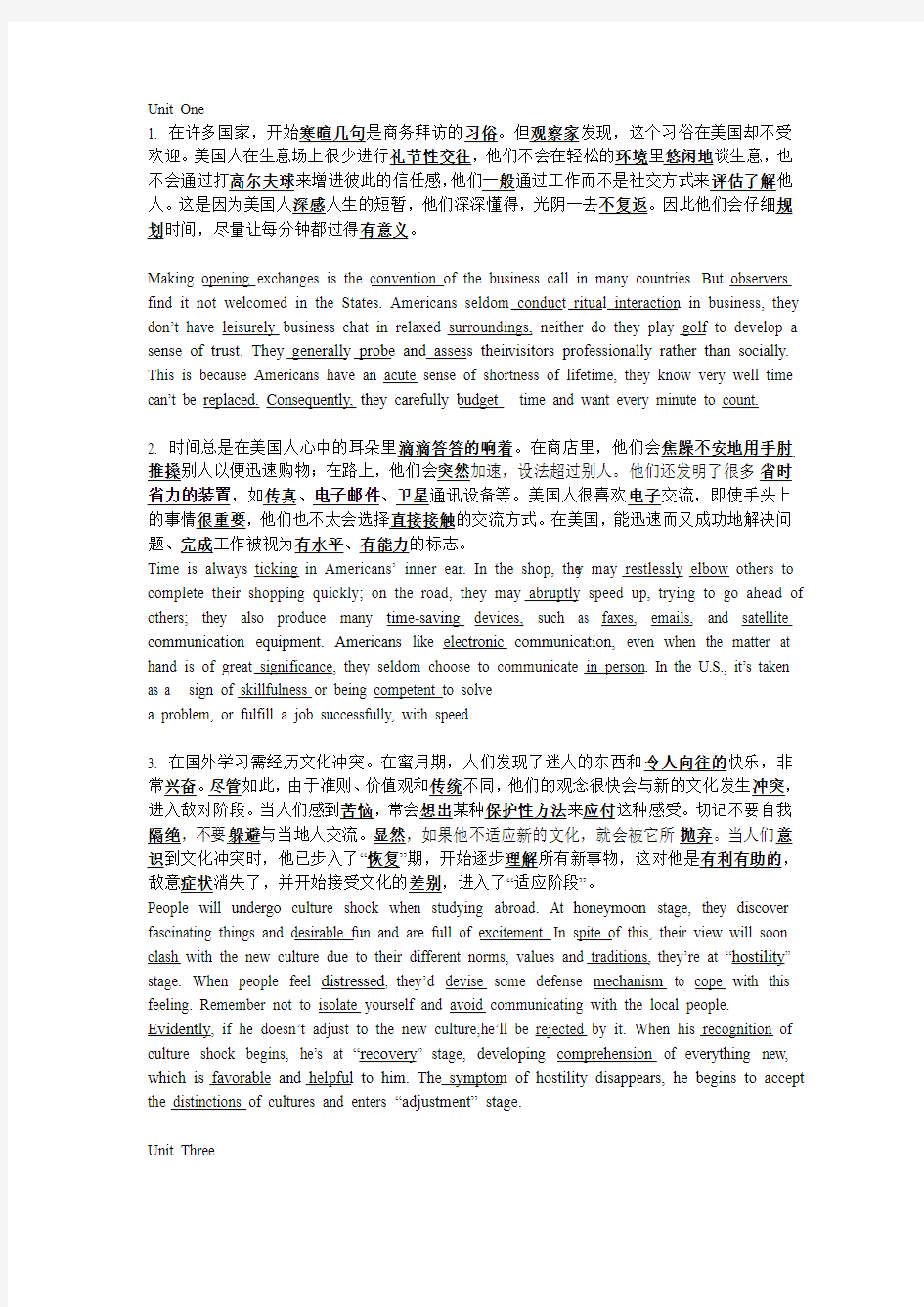
Unit 1-4 课堂翻译练习
- 格式:doc
- 大小:37.00 KB
- 文档页数:3


Unit One
1. 在许多国家,开始寒暄几句是商务拜访的习俗。但观察家发现,这个习俗在美国却不受欢迎。美国人在生意场上很少进行礼节性交往,他们不会在轻松的环境里悠闲地谈生意,也不会通过打高尔夫球来增进彼此的信任感,他们一般通过工作而不是社交方式来评估了解他人。这是因为美国人深感人生的短暂,他们深深懂得,光阴一去不复返。因此他们会仔细规划时间,尽量让每分钟都过得有意义。
Making opening exchanges is the convention of the business call in many countries. But observers find it not welcomed in the States. Americans seldom conduct ritual interaction in business, they don’t have leisurely business chat in relaxed surroundings, neither do they play golf to develop a sense of trust. They generally probe and assess their visitors professionally rather than socially. This is because Americans have an acute sense of shortness of lifetime, they know very well time can’t be replaced. Consequently, they carefully budget time and want every minute to count.
2. 时间总是在美国人心中的耳朵里滴滴答答的响着。在商店里,他们会焦躁不安地用手肘推搡别人以便迅速购物;在路上,他们会突然加速,设法超过别人。他们还发明了很多省时省力的装置,如传真、电子邮件、卫星通讯设备等。美国人很喜欢电子交流,即使手头上的事情很重要,他们也不太会选择直接接触的交流方式。在美国,能迅速而又成功地解决问题、完成工作被视为有水平、有能力的标志。
Time is always ticking in Americans’ inner ear. In the shop, the y may restlessly elbow others to complete their shopping quickly; on the road, they may abruptly speed up, trying to go ahead of others; they also produce many time-saving devices, such as faxes, emails, and satellite communication equipment. Americans like electronic communication, even when the matter at hand is of great significance, they seldom choose to communicate in person. In the U.S., it’s taken as a sign of skillfulness or being competent to solve
a problem, or fulfill a jo
b successfully, with speed.
3. 在国外学习需经历文化冲突。在蜜月期,人们发现了迷人的东西和令人向往的快乐,非常兴奋。尽管如此,由于准则、价值观和传统不同,他们的观念很快会与新的文化发生冲突,进入敌对阶段。当人们感到苦恼,常会想出某种保护性方法来应付这种感受。切记不要自我隔绝,不要躲避与当地人交流。显然,如果他不适应新的文化,就会被它所抛弃。当人们意识到文化冲突时,他已步入了“恢复”期,开始逐步理解所有新事物,这对他是有利有助的,敌意症状消失了,并开始接受文化的差别,进入了“适应阶段”。
People will undergo culture shock when studying abroad. At honeymoon stage, they discover fascinating things and desirable fun and are full of excitement. In spite of this, their view will soon clash with the new culture due to their different norms, values and traditions, they’re at “hostility” stage. When people feel distressed, they’d devise some defense mechanism to cope with this feeling. Remember not to isolate yourself and avoid communicating with the local people. Evidently, if he doesn’t adjust to the new culture,he’ll be rejected by it. When his recognition of culture shock begins, he’s at “recovery” stage, developing comprehension of everything new, which is favorable and helpful to him. The symptom of hostility disappears, he begins to accept the distinctions of cultures and enters “adjustment” stage.
Unit Three